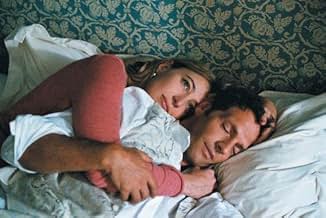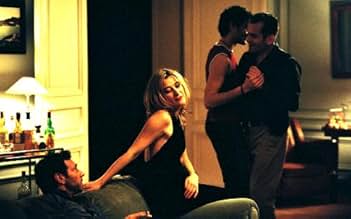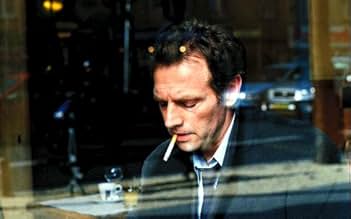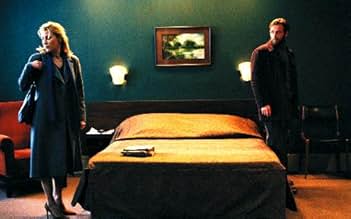CALIFICACIÓN DE IMDb
6.6/10
11 k
TU CALIFICACIÓN
Las cinco etapas del romance entre una mujer y un hombre.Las cinco etapas del romance entre una mujer y un hombre.Las cinco etapas del romance entre una mujer y un hombre.
- Dirección
- Guionistas
- Elenco
- Premios
- 1 premio ganado y 2 nominaciones en total
Valeria Bruni Tedeschi
- Marion
- (as Valeria Bruni-Tedeschi)
Ninon Brétécher
- Sophie
- (as Ninon Bretecher)
- Dirección
- Guionistas
- Todo el elenco y el equipo
- Producción, taquilla y más en IMDbPro
Opiniones destacadas
5x2 comes as a slight let-down following director Francois Ozon's recent critical and commercial success with Swimming Pool.Ozon's decision to structure the film in an anti-linear fashion is nothing original and he himself admits he was influenced by Jane Campion's little-known TV film Two Friends (1985) which used the same structure. Ozon chooses 5 crucial scenes from the life of Marion and Gilles, a middle-class couple with a son, Nicholas, whose married life quickly disintegrates into divorce. Ozon begins with the austere divorce, finishing with the moment this would-be-couple met.
The reverse structure allows the viewer to consider what went wrong and decipher why the marriage ended so bitterly. It is fairly obvious the reasons why they divorced, but Ozon and his frequent collaborator, Emmanuelle Bernhein, are as interested in the psychological worlds of these two people as their mundane reality.
The film works for the most part, but some scenes are unbelievable: Gilles's boastful confession at the party with his brother; the scene in the woods with Marion and an American tourist. These scenes undermine the subtle nature Ozon employs elsewhere. He explains too much, which isn't his style. A better edit would have made this an even better film.
As for the music, the corny 1960's Italian love songs used to close each segment are plain awful. The triviality of the songs might offer an ironic counterbalance to what is happening on screen, but the effect is of a sneering, sardonic detachment on behalf of the director. It's as if Ozon wants to dismiss every aspect of romantic culture as a fallacy.The best musical segment is at the end where Ozon's longtime composer Philippe Rombi returns some panache to the film's audio sensibilities. Special mention should go to Paolo Conte's haunting Sparring Partner which is used in the dinner scene and in the final credits.
The acting is excellent,and the closing frame is a masterstroke.But it doesn't merit that many repeat viewings as his earlier Swimming Pool did.
The reverse structure allows the viewer to consider what went wrong and decipher why the marriage ended so bitterly. It is fairly obvious the reasons why they divorced, but Ozon and his frequent collaborator, Emmanuelle Bernhein, are as interested in the psychological worlds of these two people as their mundane reality.
The film works for the most part, but some scenes are unbelievable: Gilles's boastful confession at the party with his brother; the scene in the woods with Marion and an American tourist. These scenes undermine the subtle nature Ozon employs elsewhere. He explains too much, which isn't his style. A better edit would have made this an even better film.
As for the music, the corny 1960's Italian love songs used to close each segment are plain awful. The triviality of the songs might offer an ironic counterbalance to what is happening on screen, but the effect is of a sneering, sardonic detachment on behalf of the director. It's as if Ozon wants to dismiss every aspect of romantic culture as a fallacy.The best musical segment is at the end where Ozon's longtime composer Philippe Rombi returns some panache to the film's audio sensibilities. Special mention should go to Paolo Conte's haunting Sparring Partner which is used in the dinner scene and in the final credits.
The acting is excellent,and the closing frame is a masterstroke.But it doesn't merit that many repeat viewings as his earlier Swimming Pool did.
"5x2" is not the first film to explore a relationship by going backwards from its end to its beginning (Pinter's "Betrayal" comes to mind let alone the mystery in "Memento").
But writer/director François Ozon, aided by superb acting, uses the structure for a thoughtful and intriguing commentary on love and marriage.
The first scene sets up our curiosity as while a lawyer dryly reads the divorce agreement, letting us know the cold facts of the marriage, there is palpable electricity between the about to be ex-wife and husband such that we are not surprised when they immediately head to a hotel, as it turns out their relationship started in a hotel.
We are introduced to the complexities between this couple as their layers are played out through a sexual encounter that is open to "he said, she said" interpretations that will continue as we flashback to key points in their relationship. The other four incidents show them as parents, at the birth of their child, at their wedding and at their meeting, all played out in relation to her parents' long-time conflicted marriage and his brother's homosexual arrangements, amid other encounters.
Valeria Bruni Tedeschi is so luminous as "Marion" that I'm not sure if it's her beautiful acting, as she is in turn up-tight, conflicted, sensual, fragile or aggressive, or her character who changes or that François Ozon is such a sensitive director of women, as he showed in "Swimming Pool" and "Under the Sand (Sous le sable)", that I favored her character, even if we gradually learn that she may or may not be as much of a victim as it seems and she is as much influenced by physical imperatives as he is. Stéphane Freiss plays virtually the opposite of his caring husband in "Le Grand Rôle," even if it becomes less and less clear he's the S.O.B. he at first could appear to be, or if his character experiences any changes or learns anything through serial somewhat monogamy, especially because some details in their past are just left mysterious.
The film is certainly not optimistic about love being an effective basis for a man and a woman to sustain a long term relationship and it leaves open-ended for a gendered discussion about whether that applies to the particulars of these individuals, or to them as French or as Europeans, vs. universals, as Americans would probably interpret their interactions differently than other audiences.
Certainly, in a frankly sexually mature film it's nice to see non-Hollywood bodies, of a zaftig woman and a guy without a personal trainer credit listed.
The frequent use of Paolo Conte songs on the soundtrack add to the ironic feeling surrounding the film, even if the lyrics aren't translated in the many white-on-white subtitles.
Going off into the sunset, and the cinematography and production design, from dark to light, throughout are lovely, hasn't had such an ironic conclusion since the original "Planet of the Apes."
But writer/director François Ozon, aided by superb acting, uses the structure for a thoughtful and intriguing commentary on love and marriage.
The first scene sets up our curiosity as while a lawyer dryly reads the divorce agreement, letting us know the cold facts of the marriage, there is palpable electricity between the about to be ex-wife and husband such that we are not surprised when they immediately head to a hotel, as it turns out their relationship started in a hotel.
We are introduced to the complexities between this couple as their layers are played out through a sexual encounter that is open to "he said, she said" interpretations that will continue as we flashback to key points in their relationship. The other four incidents show them as parents, at the birth of their child, at their wedding and at their meeting, all played out in relation to her parents' long-time conflicted marriage and his brother's homosexual arrangements, amid other encounters.
Valeria Bruni Tedeschi is so luminous as "Marion" that I'm not sure if it's her beautiful acting, as she is in turn up-tight, conflicted, sensual, fragile or aggressive, or her character who changes or that François Ozon is such a sensitive director of women, as he showed in "Swimming Pool" and "Under the Sand (Sous le sable)", that I favored her character, even if we gradually learn that she may or may not be as much of a victim as it seems and she is as much influenced by physical imperatives as he is. Stéphane Freiss plays virtually the opposite of his caring husband in "Le Grand Rôle," even if it becomes less and less clear he's the S.O.B. he at first could appear to be, or if his character experiences any changes or learns anything through serial somewhat monogamy, especially because some details in their past are just left mysterious.
The film is certainly not optimistic about love being an effective basis for a man and a woman to sustain a long term relationship and it leaves open-ended for a gendered discussion about whether that applies to the particulars of these individuals, or to them as French or as Europeans, vs. universals, as Americans would probably interpret their interactions differently than other audiences.
Certainly, in a frankly sexually mature film it's nice to see non-Hollywood bodies, of a zaftig woman and a guy without a personal trainer credit listed.
The frequent use of Paolo Conte songs on the soundtrack add to the ironic feeling surrounding the film, even if the lyrics aren't translated in the many white-on-white subtitles.
Going off into the sunset, and the cinematography and production design, from dark to light, throughout are lovely, hasn't had such an ironic conclusion since the original "Planet of the Apes."
Anyone who knows director Francois Ozon only for his daft musical comedy 'Eight Women' might be rather shocked by the first scene of this movie, a nasty moment of post-marital rape. The film consists of five episodes in a couple's life (hence the title), the obvious point for comparison is Bergman's 'Scenes from a Marriage', and the novelty is that we see the episodes in reverse order. After watching the first one, I was filled with dread at the horrors I would witness thereafter, seeing the poison creep into the relationship, with a growing theme of retrospectively false hope - I thought this would be a very harrowing movie. Instead, none of this happens. Ozon samples the marriage more than tells its full story, many of the scenes hint at the subtle complexity of the relationship between man and wife, but this is not a narrative of destruction, just a collection of snapshots from two lives. There are moments of perception, others seem less adept (I didn't believe the American businessman, for example); but whereas Bergman seemed to show character as destiny, here there's an incidental quality to the plot, and though I enjoyed the movie, ultimately I wasn't quite sure of its point.
This film is about 5 segments of the relationship between Gilles and Marion in reverse chronological order.
I thought the reverse chronological order would make it as confusing as "Memento", but actually it is very simple to understand. The film highlights 5 different time segments that is pivotal to the relationship. What happens in between the segments is not mentioned. It leaves the viewers much room for imagination and interpretation.
It is a story about real human beings. No one is flawless. The carnal desire of Gilles, and his shameless expression of it, destroys his love life. Valerie's passionless attitude and negativity destroys her relationship. Marion, on the other hand, gets repeatedly disappointed with life. Everything in the film is so real and close to us, unlike most films that portray fairytale couples or unrealistic lives.
I particularly like the childbirth segment, as emotions are well portrayed and affecting. I think this film is good, but not as groundbreaking as I expected it to be.
I thought the reverse chronological order would make it as confusing as "Memento", but actually it is very simple to understand. The film highlights 5 different time segments that is pivotal to the relationship. What happens in between the segments is not mentioned. It leaves the viewers much room for imagination and interpretation.
It is a story about real human beings. No one is flawless. The carnal desire of Gilles, and his shameless expression of it, destroys his love life. Valerie's passionless attitude and negativity destroys her relationship. Marion, on the other hand, gets repeatedly disappointed with life. Everything in the film is so real and close to us, unlike most films that portray fairytale couples or unrealistic lives.
I particularly like the childbirth segment, as emotions are well portrayed and affecting. I think this film is good, but not as groundbreaking as I expected it to be.
10ellkew
This is one of the most resonant films I have seen for a long time. Superb performances by both leads and a simple but very effective structure. To begin at the end and move backwards to look at moments, glimpses, fragments is such a simple device yet devastatingly effective as demonstrated with such expertise by Ozon here. I found certain moments deeply moving such as the physical assault on his wife. It seemed like a desperate attempt by the husband to try and claim power over his wife. But we know that the relationship is in the final throes of death. I loved the scene on the wedding night when she looks at her mother and father who we have previously seen rowing, just dancing alone at the reception. Somehow you know that their relationship will last and there is hope for them. The adultery the wife commits seemed to work although at first I thought it too contrived. Her pleasure on seeing her husband and love for him as he sleeps when she creeps back into the room felt very real. For me however the most beautiful and most moving sequence was the end when they first meet. It was wonderfully set up and echoed real life so well. It is always a series of events, a chain that causes all the pieces to fall in the right place and the couple to meet. It such a subtle scene when they talk on the beach as we know they are about to fall in love. When they walk into the golden sea bathed in light the two are literally becoming one as they embark on a new chapter in both their lives. The beauty of the scene is made more powerful by the conflicting emotion in our minds as we know that this love will be destroyed. How can something so perfect ever diminish? What Ozon is saying is that all things must die, that surely it is better to have loved and lost than never to have loved at all. Go and see this film. It is marvellous.
¿Sabías que…?
- TriviaIn the French edition of the DVD, the director offers a version of the movie titled "2 x 5". This version shows the five sequences in the chronological order, from the moment the couple meets till their divorce. Subtle editing work has been applied to make the movie work.
- ErroresThe scene where the American came to Marion during the wedding night and introduced himself who arrived in France today and would leave tomorrow for LA. Who would just do that? It's just lame.
(Answer: someone not coming from the USA, for instance.)
Selecciones populares
Inicia sesión para calificar y agrega a la lista de videos para obtener recomendaciones personalizadas
- How long is Five Times Two?Con tecnología de Alexa
Detalles
- Fecha de lanzamiento
- País de origen
- Sitios oficiales
- Idiomas
- También se conoce como
- Five Times Two
- Locaciones de filmación
- Productoras
- Ver más créditos de la compañía en IMDbPro
Taquilla
- Presupuesto
- EUR 5,250,784 (estimado)
- Total en EE. UU. y Canadá
- USD 128,752
- Fin de semana de estreno en EE. UU. y Canadá
- USD 15,667
- 12 jun 2005
- Total a nivel mundial
- USD 7,444,906
- Tiempo de ejecución1 hora 30 minutos
- Mezcla de sonido
- Relación de aspecto
- 1.85 : 1
Contribuir a esta página
Sugiere una edición o agrega el contenido que falta

Principales brechas de datos
By what name was 5x2 (2004) officially released in Canada in English?
Responda













